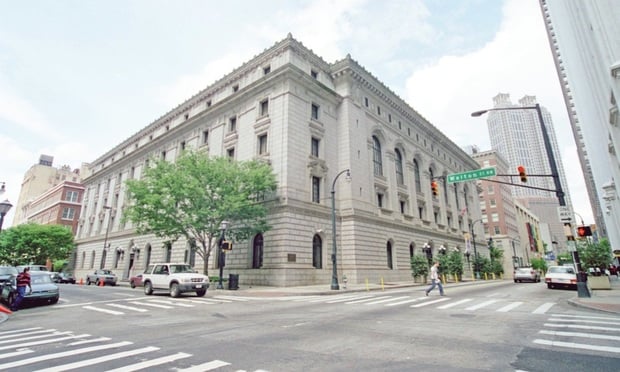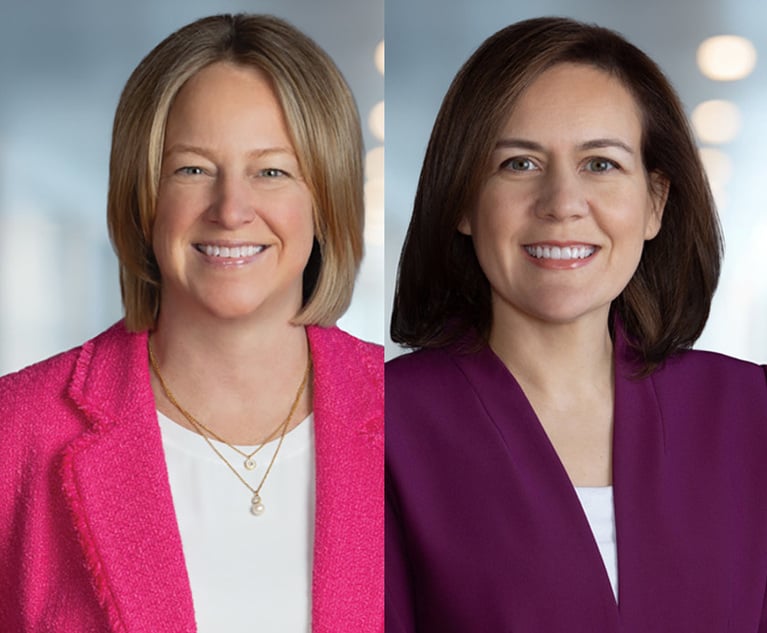SCOTUS Asked to Ignore Circuit Split on Sexual Orientation Discrimination
Freeman Mathis & Gary attorneys defending Clayton County, Georgia, in a discrimination fight over sexual orientation say the U.S. Court of Appeals for the Eleventh Circuit got it right in a finding that discrimination against people because of their sexual orientation is not prohibited under federal law.
August 10, 2018 at 04:39 PM
3 minute read
 Elbert P. Tuttle U.S. Court of Appeals Building (Photo: Rebecca Breyer/ALM)
Elbert P. Tuttle U.S. Court of Appeals Building (Photo: Rebecca Breyer/ALM)
An attorney defending Clayton County, Georgia, in a discrimination lawsuit filed by a gay employee asked the U.S. Supreme Court Friday to let stand an appellate ruling that federal laws do not prohibit discrimination on the basis of sexual orientation.
Freeman Mathis & Gary attorneys Jack Hancock and William Buechner Jr. defended the May 10 ruling by the U.S. Court of Appeals for the Eleventh Circuit in Atlanta in their response to a petition for a writ of certiorari filed by Gerald Lynn Bostock on May 25.
Bostock is represented by Brian Sutherland and Thomas Mew IV of Atlanta's Buckley Beal.
➤ PODCAST: Why This Quinn Emanuel Litigator Is Fighting for LGBT Workers
Bostock was assigned to Clayton County's juvenile court as a child welfare services coordinator in 2013 when he began playing in a gay recreational softball league that he would later claim generated criticism and led to an internal audit of county funds he managed.
Bostock was subsequently fired for conduct unbecoming a county employee, prompting the lawsuit. The county claimed the firing was legitimate, nondiscriminatory and unrelated to Bostock's sexual orientation.
Magistrate Walter Johnson and Senior District Judge Orinda Evans dismissed the case after determining Title VII of the Civil Rights Act of 1964, which prohibits employment discrimination based on race, color, religion or sex, does not bar discrimination based on sexual orientation.
The Eleventh Circuit agreed and noted in an unpublished opinion issued in May that “Discharge for homosexuality is not prohibited by Title VII.” The Atlanta-based appellate court rejected Bostock's petition to hear the case en banc. In July, the court rejected an unusual motion from its own bench for an en banc hearing—despite dissents by Judges Robin Rosenbaum and Jill Pryor.
In asking the Supreme Court to take up the case, Bostock points out federal appellate courts in the Second and Seventh Circuits have split from the Eleventh in holding that Title VII does prohibit discrimination on the basis of sexual orientation.
But Freeman Mathis lawyers argued the Supreme Court has turned down cases when circuits have been split on the underlying legal issues before. Last year, the high court denied certiorari in another Georgia employment discrimination case that the lawyers said “presented the identical issue that [Bostock] seeks to present to the Court in this case.”
This content has been archived. It is available through our partners, LexisNexis® and Bloomberg Law.
To view this content, please continue to their sites.
Not a Lexis Subscriber?
Subscribe Now
Not a Bloomberg Law Subscriber?
Subscribe Now
NOT FOR REPRINT
© 2025 ALM Global, LLC, All Rights Reserved. Request academic re-use from www.copyright.com. All other uses, submit a request to [email protected]. For more information visit Asset & Logo Licensing.
You Might Like
View All
12-Partner Team 'Surprises' Atlanta Firm’s Leaders With Exit to Launch New Reed Smith Office
4 minute read
After Breakaway From FisherBroyles, Pierson Ferdinand Bills $75M in First Year
5 minute read
On the Move: Freeman Mathis & Gary Adds Florida Partners, Employment Pro Joins Jackson Lewis
6 minute read
Veteran Litigators Move From Sidley Austin to Alston & Bird's New Chicago Office
3 minute readTrending Stories
- 1Relaxing Penalties on Discovery Noncompliance Allows Criminal Cases to Get Decided on Merit
- 2Reviewing Judge Merchan's Unconditional Discharge
- 3With New Civil Jury Selection Rule, Litigants Should Carefully Weigh Waiver Risks
- 4Young Lawyers Become Old(er) Lawyers
- 5Caught In the In Between: A Legal Roadmap for the Sandwich Generation
Who Got The Work
J. Brugh Lower of Gibbons has entered an appearance for industrial equipment supplier Devco Corporation in a pending trademark infringement lawsuit. The suit, accusing the defendant of selling knock-off Graco products, was filed Dec. 18 in New Jersey District Court by Rivkin Radler on behalf of Graco Inc. and Graco Minnesota. The case, assigned to U.S. District Judge Zahid N. Quraishi, is 3:24-cv-11294, Graco Inc. et al v. Devco Corporation.
Who Got The Work
Rebecca Maller-Stein and Kent A. Yalowitz of Arnold & Porter Kaye Scholer have entered their appearances for Hanaco Venture Capital and its executives, Lior Prosor and David Frankel, in a pending securities lawsuit. The action, filed on Dec. 24 in New York Southern District Court by Zell, Aron & Co. on behalf of Goldeneye Advisors, accuses the defendants of negligently and fraudulently managing the plaintiff's $1 million investment. The case, assigned to U.S. District Judge Vernon S. Broderick, is 1:24-cv-09918, Goldeneye Advisors, LLC v. Hanaco Venture Capital, Ltd. et al.
Who Got The Work
Attorneys from A&O Shearman has stepped in as defense counsel for Toronto-Dominion Bank and other defendants in a pending securities class action. The suit, filed Dec. 11 in New York Southern District Court by Bleichmar Fonti & Auld, accuses the defendants of concealing the bank's 'pervasive' deficiencies in regards to its compliance with the Bank Secrecy Act and the quality of its anti-money laundering controls. The case, assigned to U.S. District Judge Arun Subramanian, is 1:24-cv-09445, Gonzalez v. The Toronto-Dominion Bank et al.
Who Got The Work
Crown Castle International, a Pennsylvania company providing shared communications infrastructure, has turned to Luke D. Wolf of Gordon Rees Scully Mansukhani to fend off a pending breach-of-contract lawsuit. The court action, filed Nov. 25 in Michigan Eastern District Court by Hooper Hathaway PC on behalf of The Town Residences LLC, accuses Crown Castle of failing to transfer approximately $30,000 in utility payments from T-Mobile in breach of a roof-top lease and assignment agreement. The case, assigned to U.S. District Judge Susan K. Declercq, is 2:24-cv-13131, The Town Residences LLC v. T-Mobile US, Inc. et al.
Who Got The Work
Wilfred P. Coronato and Daniel M. Schwartz of McCarter & English have stepped in as defense counsel to Electrolux Home Products Inc. in a pending product liability lawsuit. The court action, filed Nov. 26 in New York Eastern District Court by Poulos Lopiccolo PC and Nagel Rice LLP on behalf of David Stern, alleges that the defendant's refrigerators’ drawers and shelving repeatedly break and fall apart within months after purchase. The case, assigned to U.S. District Judge Joan M. Azrack, is 2:24-cv-08204, Stern v. Electrolux Home Products, Inc.
Featured Firms
Law Offices of Gary Martin Hays & Associates, P.C.
(470) 294-1674
Law Offices of Mark E. Salomone
(857) 444-6468
Smith & Hassler
(713) 739-1250






